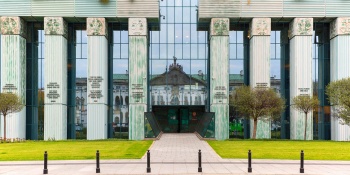Published: 11.09.2024

· Polish Catholic priest Michał Olszewski has been in custody since late March in connection with alleged irregularities in obtaining money from the Justice Fund (Fundusz Sprawiedliwości) for the construction of a center for victims of crime.
· The Justice Fund is also at the center of the case concerning the arrest in Poland of a member of the Parliamentary Assembly of the Council of Europe that led to an intervention by the PACE chairman, who called for MP Marcin Romanowski’s immediate release.
· The Warsaw-Mokotów District Court has set another date for a hearing on the detention of Fr. Michał Olszewski.
· The court questioned the clergyman on September 6. The next hearing is scheduled for October 18.
· Fr. Olszewski’s attorney, Krzysztof Wąsowski, highlighted numerous irregularities in the detention and subsequent treatment of the priest. As the attorney points out, the clergyman’s health has significantly deteriorated.
· The Ordo Iuris Institute has filed an amicus brief (amicus curiae) in this case.
· In the brief, the Ordo Iuris lawyers cite the unjustified and cruel measures applied to Fr. Olszewski, including prolonged meal deprivation, hours spent in handcuffs, exposure to the public during transit, and lack of access to a lawyer.
Fr. Michał Olszewski has been in pre-trial detention since March 26. According to the detainee’s testimony, as well as that of his defense attorney, the priest has repeatedly endured terrible treatment from the authorities. The clergyman faced complications in contacting his lawyer and using the toilet, and he was denied food for dozens of hours.
The Ordo Iuris Institute notes in its brief that, according to Article 245 § 1 of the Code of Criminal Procedure, a detainee, at his request, should immediately be allowed to establish contact with a lawyer or legal counsel in an accessible manner and be able to speak directly with him. However, Fr. Olszewski stated that, when he was detained, he was not given such an opportunity, and he only learned of the arrest details when an Internal Security Agency (Agencja Bezpieczeństwa Wewnętrznego – ABW) officer informed his lawyer.
The clergyman also stated that the ABW officers handcuffed him during his arrest. The Law on Direct Coercion Measures and Firearms defines the situations in which justice officials can apply such measures. From the communications of the National Prosecutor’s Office (Prokuratura Krajowa) regarding Fr. Olszewski’s case, it does not appear that, in this situation, the clergyman behaved in a way that would justify handcuffing.
In a letter made public by Mr. Wąsowski, Fr. Olszewski also asserted that, while being handcuffed during transit, he was exposed to the public at a gas station. This happened when he asked to use the restroom at a travelers’ service area. However, he was taken into the gas station convenience store, where he was forced to stand while officers purchased hot dogs. Ordo Iuris notes in its brief that the European Court of Human Rights explicitly states that leaving a handcuffed detainee in plain view, without reasonable grounds, is a violation of Article 3 of the Convention for the Protection of Human Rights and Fundamental Freedoms.
The attorneys also referred to Fr. Olszewski’s account, according to which he was deprived of meals for two days and had restricted access to water. According to Article 109(1) of the Executive Penal Code, a convicted prisoner in a penitentiary or detention center should receive food and drink of adequate nutritional value three times a day, including at least one hot meal. The priest was also handcuffed at all times while in the detention room, even while handling physiological needs.
In the opinion of Ordo Iuris, such behavior by the Polish authorities constitutes illegal and irregular detention. Moreover, this behavior invites charges of cruel and inhumane treatment of a detainee. This treatment is incompatible with numerous acts of domestic and international law, such as the Polish Constitution, the Universal Declaration of Human Rights, the International Covenant on Civil and Political Rights, and the Charter of Fundamental Rights of the European Union.

16.06.2025
Shortly after the end of the second round of Polish presidential elections, which took place on 1 June 2025, the International Observation Mission of the Organisation for Security and Cooperation in Europe (OSCE) issued a Statement of Preliminary Findings and Conclusions concerning the elections.

10.06.2025
According to the authors of the report published today, titled “Violations of the Principles of a Democratic State of Law and the Rule of Law by the Government Donald Tusk after December 13, 2023,” the authorities, under the leadership of Polish PM Donal

09.06.2025
Presidential elections, which have just taken place in Poland, were won by the candidate supported by the opposition. According to the law, the validity of the elections should be decided by the Extraordinary Review and Public Affairs Chamber of the Supreme Court. However, the government is questioning the competence of this chamber, which could be interpreted as an attempt to obstruct the transfer of power to the newly elected president.

23.05.2025
We are currently engaging with think tanks and political parties across the continent to collaboratively develop a detailed counter-proposal to the centralist, anti-national, and anti-democratic vision of the European Union promoted by the European Parliament and President Macron.